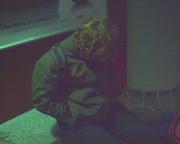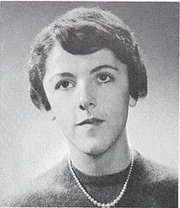Putting ADHD people together can be
like trying to lie magnets together. They resist.
In the case of my son and I it means we
bark at one another with the slightest provocation. We’re ready to
see intent where none exists. We misunderstand. We speak in
incomplete sentences. Our expectations for one another are very high,
and when they’re not met it hurts.
John has had a lot more therapy than I
did at 16. He’s gotten a lot more help. He’s given himself more help,
too, joining a church of questioning believers. Yet he has a lot more
trouble than I did dealing with people his own age.
I think it’s because in John’s life
he’s lacked peers. I mean real peers, people like him. Not just the
same age, but similar in temperament, in attitude, in intelligence
and love of learning.
That’s the lesson of my own life,
anyway.
We had tracks when I was in school 40
years ago. I spent 10 years around the same kids, and in time they
learned my quirks while I learned theirs. Not that I wanted to be
their friends when I left.
Instead I went off to a school that, at the
time, was filled with crazies just like me, a regular ADHD festival.
There I was the social one. I fit right in. Science geeks,
engineering geeks, even theater geeks. I was an academic geek. But we
were all geeks together. For the first time in my life I was
surrounded by people who were just like me, and people who believed
in me.
“What do you want to do?” a teacher
asked. I admitted I didn’t want to be a lawyer, I wanted to be a
journalist, a writer, and wasn’t certain I could measure up. “You’re
a Rice person,” he said. “Whatever you want to do, you’ll be
great at it.”
I’m not great at it. I’m good at it.
But I was fired up by that talk, and the work I do is the work I
love. It’s a happy life.
In those terms, of just fitting in,
John has it much harder than I ever did. There’s nowhere for him to
fit.
We live in the inner city. John has
usually been the only really smart, intensely academic kid in his
school. He has no friends. He spends his off-hours at his computer,
playing strategy games, sometimes on the Internet. Those people
aren’t real. They’re what they do on the screen. When he loses he
jumps up-and-down, he pounds his fist and pounds the floor. If the
other player were with him, they’d leave.
That’s his social life. Not that we
haven’t tried other things. He goes to a wonderful camp each summer , filled
with kids like him, and there he’s a role model. He played recreation
soccer for years, but now that he’s 16 there’s no team for him, and
he refuses to play for his school, says it would take too much time
away from study. The church youth group was strong his freshman year,
but it has withered. Usually when there’s an event, a hike or a trip
to the movies, he’s the only one who signs up, and it’s canceled.
Imagine being the only one like you for
miles around. We’re in the middle of this immense city of 6 million
yet he’d might as well be in the Alaska wilderness.
The way John deals with this world is
by trying to follow the rules. Every rule. Every single one. He
believes in the rules, and believes everyone else should too. It
upsets him when anyone fails to obey the rules. It burns him up, but
he got in trouble when he used to get on them about it, and now he
just burns inside. Follow the rules, he thinks. If you follow the
rules you can’t get in trouble.
But of course you can get in trouble.
You can get in lots of trouble. If you can’t read other people, if
you don’t know how your behavior looks to them, if you’re isolated,
alone, you can get into a lot of trouble. And when he does get into
trouble, John seeks protection in the rules. It’s maddening, to him,
to me, to everyone around him. But he didn’t learn those things in
kindergarten you’re supposed to learn in kindergarten. Thanks to ADHD
those parts of his brain which are trained in kindergarten did not
exist then. They came later, and now that he’s ready to learn those
things you learn in kindergarten everyone else has moved on. They
assume everyone knows them. Those who don’t are bad. Or stupid. Or
something.
Or just brilliant? I ask myself that
sometimes.
For the last months John was working
hard as part of a Model Arab League. Some of the history students
would go to another high school for two days and compete there. He
did a lot of research. He did a lot of writing. He marshaled his
arguments. He was looking forward to it. Probably more than he let
on.
Then two days before the event his
teacher calls. There had been an incident in class. There are always
incidents. His intensity is often frightening. But this was too much.
“I’m afraid I can’t take him to the Arab League,” she said
sorrowfully. “I had to write this up.”
That scared me. When a public school
teacher “writes up” an incident, it can mean detention, it can
mean suspension. In the most recent case, which regular readers here
may recall, it
nearly got John kicked out of school. It still might. The “cover
our ass” process leading to legal protection, through what’s called
the Program for Exceptional Children, should be complete next week.
But only if the powers that be accept that John does indeed have ADHD
and it did indeed cause the incident in question will they even let
him stay in this school and challenge his mind. They’ll send him back
to another, closer school which can’t teach him anything and dare me
to sue, having covered their asses so completely I wouldn’t have a
chance.
Bastards.
So when John got home, after I got the
phone call, I was mad out of fear for him. “How could you?” I
demanded, and he “How could you?” ‘d right back. He slammed the
door. I slammed the door. We couldn’t talk about it. I dropped him
off at his bus stop next morning and, rather than waiting with him
for the bus to arrive, told him to just get out. Slam went the car
door.
There’s a therapy called DBT
I’d like him to try. It was designed for people with serious
problems,
who used to be called bipolar. There’s a woman who recently moved to
Atlanta, who wants to make her name applying DBT to ADHD cases. She
wants to set up a group.
I want John in that group.
I called the day of the phone call. Got
an appointment with, it turned out, an associate, a man my own age,
who had moved here a year ago to associate with a college and, I
assume, this professor’s work. He didn’t promise to get us DBT
therapy. He took John’s history, and told us there was some
administrative hang-up in getting the group started. You know how it
is.
Near the end he asked about the
incident with the teacher. John repeated what I learned he had told
his mother.
The teacher wanted them to bring an
extra notebook to class. Plus some readers, some additional books. To
every class. On top of his other stuff.
“’I can’t do it,’ I told her. ‘I
can’t carry the books I need now.’” He insists he can’t get to a
locker, then to class, in the time they give him between classes.
That would violate the rules. He believes in the rules. So everything
goes in his backpack or under his arms, and gets lugged around. From
home to school. From class to class. Back home. This was the straw
that broke the camel’s back. “’I tried to reason with her. I tried
to be logical.’”
“Why not be late?” the therapist
asked.
“You don’t understand. They have hall
monitors. They’ll give you detention in a minute if you’re late. I
can’t do it. I explained it.”
“And when that didn’t work?” the
therapist asked.
“I guess I got mad,” he said. “I
don’t remember.”
He lost his chance to shine because he
wouldn’t break the rules to use his locker.
So we wait. For therapy. For a
decision. For college, perhaps some peers. And John remains isolated,
terribly isolated. Brilliant, an A+ student in the toughest
curriculum the public school system here can find, but still,
terribly, terribly isolated. From me. From his classmates. Maybe from
himself.
Life sucks sometimes.

















I might be stating the obvious, but sometimes people can’t see the wood for the trees.
Your son seems to have a bit of tunnel vision, concentrating on the subject at hand. This is fine when assigned a specific task.
I think you should try some training in lateral thinking.
http://en.wikipedia.org/wiki/Lateral_thinking
For example, take the carrying books problem.
Does he have a lunch break? Yes?
Then he only has to carry the morning books till lunchtime, then go to the locker and swap to the afternoon books.
He could get a bigger backpack. with a metal frame, like the hikers use.
He could get a pull case with wheels.
He could get a foldup bag to carry more stuff in one hand when needed, etc.
That’s what lateral thinking does, throw out wild ideas until something goes ‘ding!’ – that’s the solution!
Can’t do any harm to try anyway.
Best wishes
I might be stating the obvious, but sometimes people can’t see the wood for the trees.
Your son seems to have a bit of tunnel vision, concentrating on the subject at hand. This is fine when assigned a specific task.
I think you should try some training in lateral thinking.
http://en.wikipedia.org/wiki/Lateral_thinking
For example, take the carrying books problem.
Does he have a lunch break? Yes?
Then he only has to carry the morning books till lunchtime, then go to the locker and swap to the afternoon books.
He could get a bigger backpack. with a metal frame, like the hikers use.
He could get a pull case with wheels.
He could get a foldup bag to carry more stuff in one hand when needed, etc.
That’s what lateral thinking does, throw out wild ideas until something goes ‘ding!’ – that’s the solution!
Can’t do any harm to try anyway.
Best wishes
Dana – I have an idea on what else might be going on with your son, having been there and done that in my own way. There’s an lj community I’m on which is full of stories like that, especially the one about the primacy of The Rules. Contact me offblog at mathews55@msn.com.
Pat
Dana – I have an idea on what else might be going on with your son, having been there and done that in my own way. There’s an lj community I’m on which is full of stories like that, especially the one about the primacy of The Rules. Contact me offblog at mathews55@msn.com.
Pat
The situation your son describes sound very much like what my son has encountered, but he’s been diagnosed (in the school setting, not the clinical setting yet) with Asperger syndrome.
He’s a great kid who really wants to follow the rules, and expects others to follow them, but because of this disorder he lacks some of the normal brain connections to be able to deal with the issues and the people involved in a constructive way.
When confronted with logical inconsistencies like the classroom situation you’ve described (which sounds similar to issues my son has encountered as well), he melts down and rages. When confronted with peers who don’t play by the rules, he does likewise.
His particular run-in with “zero tolerance” at the schools involved kids teasing him until something, spoken in impotent rage, included a threat. Amazingly, schools seem to tolerate teasing and non-physical bullying, but go off the rails when the one being teased or bullied gets angry about it and says the wrong thing in return.
Note that kids with Asperger syndrome and other autism spectrum disorders are sometimes misdiagnosed with ADHD.
I’m not making suggestions, I’m just empathizing, since my situation in some ways mirrors yours. Good luck, I feel for you!
The situation your son describes sound very much like what my son has encountered, but he’s been diagnosed (in the school setting, not the clinical setting yet) with Asperger syndrome.
He’s a great kid who really wants to follow the rules, and expects others to follow them, but because of this disorder he lacks some of the normal brain connections to be able to deal with the issues and the people involved in a constructive way.
When confronted with logical inconsistencies like the classroom situation you’ve described (which sounds similar to issues my son has encountered as well), he melts down and rages. When confronted with peers who don’t play by the rules, he does likewise.
His particular run-in with “zero tolerance” at the schools involved kids teasing him until something, spoken in impotent rage, included a threat. Amazingly, schools seem to tolerate teasing and non-physical bullying, but go off the rails when the one being teased or bullied gets angry about it and says the wrong thing in return.
Note that kids with Asperger syndrome and other autism spectrum disorders are sometimes misdiagnosed with ADHD.
I’m not making suggestions, I’m just empathizing, since my situation in some ways mirrors yours. Good luck, I feel for you!
Dana
My granddaughter has ADHD. Fought it from preschool through 9th grade. She was diagnosed in 4th grade and put on Ritalin. Her parents didn’t like that solution so they searched for others. Finally they went to a chiropractor who suggested a certain combination of amino acids aimed at helping ADHD afflicted persons. She now takes them regularly. As long as she stays on them, she is fine, able to control her explosions and focus on her studies to maintain her A grade status. She did not relate to her peers until she attended college. She is now 23 and is almost caught up with her social skills. That solution may not help everyone, but it works for her. Sometimes she stops taking the pills and it is very noticeable. Her temper shortens, she is likely to blow up at very little provocation, and once again she has difficulty focusing. Hope you find the right answer for your son. I know how hopeless you can feel trying to reason with someone who doesn’t want to hear it.
Dana
My granddaughter has ADHD. Fought it from preschool through 9th grade. She was diagnosed in 4th grade and put on Ritalin. Her parents didn’t like that solution so they searched for others. Finally they went to a chiropractor who suggested a certain combination of amino acids aimed at helping ADHD afflicted persons. She now takes them regularly. As long as she stays on them, she is fine, able to control her explosions and focus on her studies to maintain her A grade status. She did not relate to her peers until she attended college. She is now 23 and is almost caught up with her social skills. That solution may not help everyone, but it works for her. Sometimes she stops taking the pills and it is very noticeable. Her temper shortens, she is likely to blow up at very little provocation, and once again she has difficulty focusing. Hope you find the right answer for your son. I know how hopeless you can feel trying to reason with someone who doesn’t want to hear it.